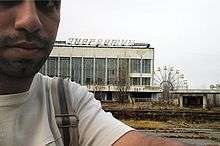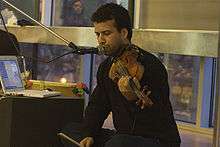Márcio-André
| Márcio-André | |
|---|---|
 Marcio-Andre in Chernobyl | |
| Born |
Márcio-André de Sousa. March 2, 1978 Rio de Janeiro, Brazil |
| Other names | M-A |
| Occupation | Writer, translator, performer, sound poet, theorist |
| Website | www.marcioandre.com |
Marcio-Andre (born March 2, 1978, Rio de Janeiro) is a Brazilian writer, translator, performer, sound poet and theorist.
Biography
Márcio-André de Sousa Haz (he signs just Márcio-André) graduated in Literature and has a master's degree in Poetics from the Federal University of Rio de Janeiro.[1] In 2008, he received a scholarship-prize from the Brazilian National Library Foundation[2] and, in 2009, was poet-in-residence in Monsanto, Portugal.[3] He taught an advanced training course in creative writing and sound poetry at University of Coimbra and literary theory at the Federal University of Rio de Janeiro.
In 2007, he appeared in newspaper headlines for his suicide performance in the ghost town of Chernobyl.[4] In his lecture-of-one-man (that he called "Conference Poetic-Radioactive of Pripyat"), Marcio-Andre remained six hours reading his poems between the ruins of the ghost-town Pripyat (Chernobyl), in the so-called Zone of Exclusion, under the deliberate risk of contamination by cesium 137 and strontium 90. After the event, he received the nickname "poeta radioativo" (radioactive poet). This performance resulted in the book Ensaios Radioativos, where he describes the experience of contamination.[5]
Literature
Belonging to the so-called "Generation 00" of literature in Brazil,[6] Marcio-Andre is an influential[7] and relevant[8] poet of the younger generation in Brazil and a controversial essayist.[9] With three published books, he was chief-editor of the binational (Brazil / Portugal) Confraria Magazine (ISSN 1808-6276)[10] and founder of Confraria do Vento.[11] Eventually he began to write for Brazilian newspapers such as O Globo,[12] Jornal do Brasil[13] and Estado de Minas.[14] As a translator, he has published texts of Gilles Yvain, Serge Pey, Gherasim Luca, Mathieu Benezet, Paul Valery and Hagiwara Sakutaro.[15]
Performance and sound poetry

Multimedia artist, Marcio-Andre has stood out with his research in the area of sound poetry.[16] He held solo performances in several cities in the world, including Paris, London, Lima, Rotterdam, Buenos Aires, Lisbon and São Paulo.[17] Between 2004 and 2007, led the group Arranjos para assobio (Arrangements for whistle) of poetic textures and experimental realities, linked with a sound research project at UFRJ, under academic advising by the philosopher Manuel Antonio de Castro. In 2009, he presented a performance with the American poet Bruce Andrews.[18] In 2009, he has toured to Europe with his work Indivisible: polyphonic-poem for voices, violin, electronic processing, bells and whistles[19]
In his performances, Marcio-Andre uses the computer to processing, live, harmonics sounds and percussive sounds taken from the violin and voice. From this processing, from the creation of electronic textures and from loop recordings, it overlaps sound layers and folds to create a uniform mass of texts and sounds. In his plays are noted influences from noisy music, minimalist music and Eastern music, especially by the use of Tibetan chants and modes of Noh theater. He uses, yet, abstract projections, videodances and video loops projected onto the stage and incorporates various other props in presentations.
Published works
- Movimento Perpetuo (Editora UFRJ, 1998)
- 8 Poetas (Editora UFRJ, 2002)
- Musica Cuantica (plaquete) (2003)
- Cazas (plaquete) (Coleção Mimeo, 2006)
- Intradoxos (Confraria do Vento, 2007)
- Confraria 2 anos (Confraria do Vento, 2007)
- Ensaios Radioativos (Confraria do Vento, 2008)
Notes
- ↑ International Meeting of Poets: http://www1.ci.uc.pt/poetas/eng/biography/marcio-andre.html
- ↑ Culture Ministry of Brazil website: http://www.cultura.gov.br/site/2008/06/24/bolsas-da-fundacao-biblioteca-nacional/
- ↑ FONSECA, Luiz. “Aldeia lusa tenta ser referencia em residencia de artistas”, in: Lusa (Agencia Lusa). Portugal: April 2009
- ↑ ISAACK, Marcelo. Em busca das cidades perdidas. Jornal do Brasil. November 17, 2007, 34. Online: http://www.sendspace.com/file/a7ae5y
- ↑ MARCIO-ANDRE. “Ensaios Radioativos”, Confraria do vento, 2008
- ↑ MOISES, Carlos Felipe. “Os ensaios radioativos de Marcio-Andre”. in: Cronopios. São Paulo: 2007
- ↑ MENDES, Andre di Bernardi Batista. "Ao sabor do vento", Estado de Minas, December 20, 2008, Suplemento Pensar, 3–4. Online: http://www.sendspace.com/file/f2ic1i
- ↑ BORGES, Julio Daio. Introdução a entrevista com Marcio-Andre, in: Digestivo Cultural. São Paulo, March 2008
- ↑ BOSCO, Francisco. “Afirmação poetica da vida”. in: Jornal O Globo (Caderno Prosa & Verso). February 21, 2009
- ↑ PIRES, Francisco Quinteiro. “Confraria e levada para o papel”, in: O Estado de S. Paulo (Caderno de Cultura), November 25, 2007.
- ↑ CARVALHO, Andrea. “Far away from the drawers”. in: Scene4 Magazine. EUA: August 2007
- ↑ "L=A=N=G=U=A=G=E 40 graus", in: O Globo, suplemento Prosa & Verso. Rio de Janeiro: August 1, 2009.
- ↑ "Uma abertura de possibilidades" (resenha sobre a antologia digital ENTER de Heloisa Buarque de Holanda), in: Jornal do Brasil. Rio de Janeiro: August 20, 2009. Online: http://jbonline.terra.com.br/pextra/2009/08/28/e280826193.asp
- ↑ "Maquina de Experimentar". O Estado de Minas, caderno Pensar. Belo Horizonte, December 5, 2009.
- ↑ Online biography(Coimbra University): http://www1.ci.uc.pt/geaa/images/stories//cv_marcioandre.pdf
- ↑ Online: http://acd.ufrj.br/~travessiapoetic/ubuweb/marcio-andre.html
- ↑ Online: http://www.myspace.com/intradoxos
- ↑ "L=A=N=G=U=A=G=E 40 graus", in: O Globo, suplemento Prosa & Verso. Rio de Janeiro: August 1, 2009.
- ↑ Online: http://www.youtube.com/watch?v=YdSZJD0YRm8&feature=fvsr
External links
|